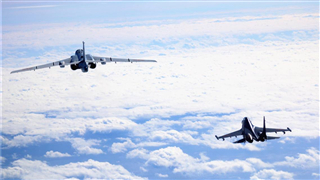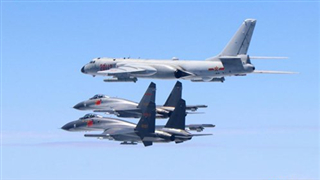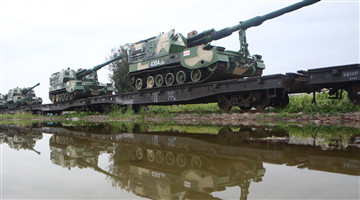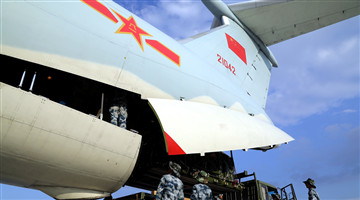By Liang Fang
The US-Iran tension continues and their fight over the control of the Strait of Hormuz keeps escalating. General Joseph Dunford, Chairman of the US Joint Chiefs of Staff, and his possible successor General Mark Milley both indicated recently that the US was working to put together a coalition with its allies to ensure "freedom of navigation" at the Strait of Hormuz and the Babel-Mandeb Strait in the Middle East. Iran, at the same time, is planning to charge tolls in the Strait of Hormuz in return for its efforts to maintain security in the region.
Under the threats of America's "military escorts" vs Iran's "forced tolls", the Strait of Hormuz has once again become a powder keg that worries the world 30 years later.
The US has three purposes by proposing the military escort coalition:
The first purpose is imposing a new round of extreme pressure on Iran. Holding up high the "America first" flag, the US has constantly slapped sanctions on other nations and put extreme pressure on a rival state like Iran. It began to completely block Iran's oil export on May 2, which nonetheless didn't fully break off even though it caused serious impacts on the Iranian economy. In response, Iran not only raised its uranium enrichment, but also tried to work with the EU to save the Iran nuclear deal, which made America's sanctions much less effective. Under such circumstances, the US will definitely step up the pressure on Iran. The US and UK took advantages of the intricate oil tanker attacks and sent more troops to the Gulf, attempting to force Iran to knuckle under grave military pressure.
The second purpose is turning the "sanction" issue into an issue of "freedom of navigation". America's blockade of Iran's oil export seriously upset the global energy market. The Strait of Hormuz is the converging point of multi-national interests and one of the most important oil trade routes in the world. According to statistics, 21 million barrels of oil were transported across the strait per day on average in 2018, accounting for 21% of global oil consumption, while the volume of LNG passing the strait took up over 1/4 of the world's LNG trade. A crisis at the s trait will have tremendous impacts on world economy. Thus, American allies including EU are not very active in sanctioning Iran, and EU even considers establishing a new oil payment system to circumvent the US sanction and continue doing business with Iran.
By proposing the escort coalition, the US slyly turned its sanction against Iran into an issue of freedom of navigation at the Strait of Hormuz involving the interests of multiple countries, and tried to embroil more countries in order to make the issue more complicated, extensive and international, and consequently justifies the sanctions.
The third purpose is pushing an "Arab NATO in the Gulf" conception. In September 2018, Washington proposed a collective security pact tentatively known as "the Middle East Strategic Alliance" (MESA), which pulled together the six members of the Gulf Cooperation Council as well as Egypt and Jordan to oppose Iran in the name of the "Arab NATO in the Gulf". However, this conception made little progress due to the deep-rooted conflicts among some Gulf countries, and now the oil tanker attack provided a precious opportunity for the US to push it through.
The so-called military escort coalition is actually a military alliance against Iran led by the US and mainly comprising Gulf nations, which aims to contain and deter to the largest extent Iran's military activities in the Strait of Hormuz. The planned escort scope ranges from the Strait of Hormuz to the Babel Mandeb Strait, so that the US can rope in more Middle East allies instead of going it alone. The US will be in position to encircle and suppress Iran by a bigger bargaining chip.
However, America's constant use or threat of use of force in the Middle East regardless of the UN's role can hardly reach the goal.
First of all, high risks keep off most US allies. Although the allies support America's actions to some extent, they are all cautious about joining the escort operations. The UK seems to have been ready to join the operations though considering its detention of the Iranian oil tanker, since it is eager to find itself a new position in the world landscape after the Brexit. Japan, Saudi Arabia and UAE are likely to join too as their merchant ships had been attacked. The EU members, however, reacted more cautiously in general. France and Germany don't want to be enemy with Iran or follow America's steps to escalate the sanction against it, much less to exacerbate the situation in the Gulf, so they are unlikely to join the escort operations given America's declining influence on the EU and the rise of Europe. Besides, as the Gulf countries rely highly on oil export for economic development, they are worried that a war in the Strait of Hormuz may cut off the oil route. Therefore, it's possible that some of them will join the US-initiated escort coalition, though of a small number and on a small scale.
Second, a military alliance without UN authorization has no justification. The multinational naval escort taskforce organized by the UN has been performing escort missions in the Gulf of Aden for 11 years, and the maritime security situation there and in Somali waters has improved considerably. Now the US wants to bypass the UN and form a new combined escort taskforce, but it may encounter new problems. Any action taken by the US at the Strait of Hormuz, such as monitoring, interception, boarding, inspection and detention, may be criticized and opposed by the UN, the international community and surrounding countries, and be restricted by relevant international laws. Russia has publicly stated that the US was advocating "freedom of pirates" under the pretext of safeguarding "freedom of navigation".
Additionally, America's excessive use of force intensified tensions among countries bordering the strait. Navigation through the Strait of Hormuz has been safe for more than 30 years because the Gulf countries, despite their long-standing conflicts, have jointly kept the strait clear out of common interests. However, the US, as a country out of the region, has constantly challenged the security bottom line in the Middle East. US pulling out of the Iran nuclear deal put out the light of hope for peace in the Middle East and its frequent use of force has aggravated all sorts of conflicts and regional instability. If the Strait of Hormuz is in trouble, so will the Gulf region, and no country will be able to step back unscathed. Countries by the strait are fully aware of this and know they will bring trouble to themselves by blindly following the US.
(The author is a professor with the College of National Security, National Defence University of the Chinese People's Liberation Army)











